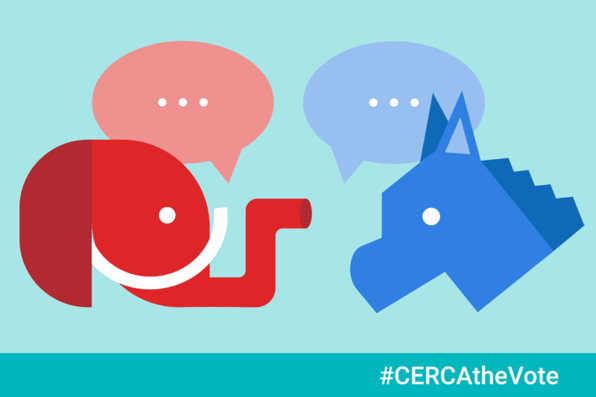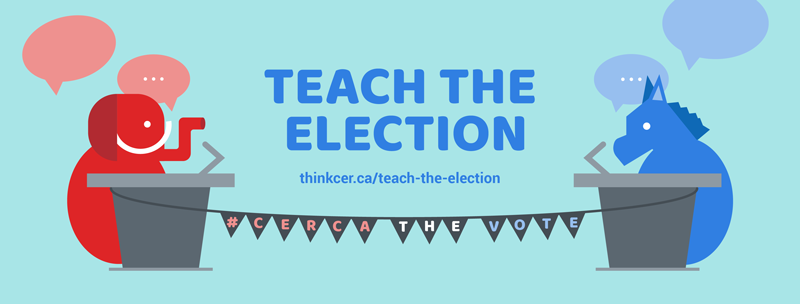
#CERCAtheVote: Clinton Defends Family Foundation Against “Pay to Play”
As the countdown to the election draws nearer, and as many private emails from Hillary Clinton’s associates reach the public, increased scrutiny has been raised about the legitimacy of the Clinton Foundation.
During the final debate, moderator Chris Wallace pressed Hillary Clinton to answer whether foreign donors to her family’s foundation participated in “pay to play” – that is, if they gained direct access to America’s Secretary of State by donating large sums of money to the Clinton Foundation.
[Related: Does Donald Trump’s claim of a ‘rigged election’ hold up?]
While Clinton has vehemently denied any wrongdoing on the part of her family’s foundation, Wallace’s question was a notable moment in the debate when Clinton seemed to avoid a direct response (as parodied by Saturday Night Live).
We lay out the CERCA elements used by Clinton to defend her family’s foundation against the “pay to play” accusations. Your students can debate – did she effectively defend the Clinton Foundation and refute counterarguments?
The Debate Prompt
Moderator Chris Wallace said:
“Secretary Clinton, during your 2009 Senate confirmation hearing, you promised to avoid even the appearance of a conflict of interest with your dealing with the Clinton Foundation while you were Secretary of State. But emails show that donors got special access to you, those seeking grants for Haiti relief were considered separately from non-donors, and some of those donors got contracts – government contracts, taxpayer money.
“Can you really say that you kept your pledge to that Senate committee and why isn’t what happened and what went on between you and the Clinton Foundation, why isn’t what Mr. Trump calls ‘pay to play’?”
[Annotated and fact-checked transcript of the final debate]
Hillary Clinton’s response follows:
The Claim
“Well, everything I did as Secretary of State was in furtherance of our country’s interests and our values. The State Department has said that, I think that it’s been proven. But I am happy — in fact, I am thrilled to talk about the Clinton Foundation because it is a world renowned charity and I am so proud of the work that it does.”
Note: This claim only briefly responds to the moderator’s question, and then pivots quickly to a secondary claim, which is that the Clinton Foundation does good work. This latter claim is Clinton’s actual argument, and what she defends in the rest of the evidence cited.
The Evidence
“Very quickly, we at the Clinton Foundation spend ninety percent — ninety percent — of all the money that is donated on behalf of programs of people around the world and in our own country. I’m very proud of that.”
and
“The Clinton Foundation raised thirty million dollars to help Haiti after the catastrophic earthquake and all of the terrible problems the people there had.”
The Reasoning
“We have the highest rating from the watchdogs that follow foundations.”
and
“We’ve done things to help small businesses, agriculture and so much else.”
The Counterargument
“And I’d be happy to compare what we do with the Trump Foundation, which took money from other people and bought a six foot portrait of Donald. I mean, who does that? It just was astonishing.”
The Audience
Clinton’s audience was at least 84 million people – most of them, likely, American voters – who watched the debate on television, in addition to many more who streamed online.
As for the audience-appropriate language, it’s important to note that Clinton does not repeat notable phrases of the question – like “pay to play” or “access.” She uses mention of the Clinton Foundation to steer into general praise of the foundation, rather than directly address the moderator’s question. And by asking, “I mean, who does that?” during the debate, she’s using language that could help her appear more relatable to voters.
Was this helpful? Visit our Elections Hub to find more ways to teach the election, or check out these previous #CERCAtheVote prompts:
- Michelle Obama Says Trump Comments Can’t Be Ignored
- The Chicago Tribune States the Case for Gary Johnson
- Clinton and Trump Accuse Each Other of Enabling Terrorism


Mallory Busch is ThinkCERCA's Editor of Content Strategy. A graduate of Northwestern University, Mallory came to ThinkCERCA from stops in audience strategy at TIME magazine and news applications development at Chicago Tribune and The Texas Tribune. She holds degrees in Journalism and International Studies, and was a student fellow at Knight Lab in college.
